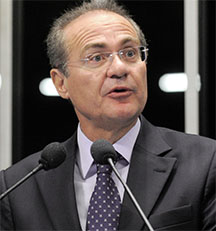BRASILIA, (Reuters) – Brazilian President Dilma Rousseff raced yesterday to defuse a rebellion by legislators upset about her budget austerity plans and her handling of a corruption scandal at state-run oil company Petrobras.

Rousseff met with legislative leaders from her coalition after they unexpectedly threw out a presidential decree that would have raised payroll taxes and helped close a gaping hole in Brazil’s budget.
“This is very serious for Rousseff,” said political analyst Gabriel Petrus of Brasilia-based consultancy Barral M Jorge Associates. “It looks as if there is no political stability on top of the economic crisis.”
The economic impact of the congressional maneuver late on Tuesday was unclear, but it was a sign of how fallout from the scandal at Petroleo Brasileiro SA, as Petrobras is formally known, threatens Rousseff’s agenda and could increase the threat of a recession this year.
Rousseff vowed to improve communication with allies before sending more belt-tightening measures to Congress, said lawmakers who met with her. If Congress blocks them, the government will have to make deeper spending cuts elsewhere to meet its fiscal savings target of 1.2 percent of gross domestic product this year, her minister for congressional ties, Pepe Vargas, told reporters.
Brazil’s real tumbled more than 2 percent on Wednesday and briefly hit 3 per dollar for the first time since 2004 as some investors worried the fiscal problems could cause Brazil to lose its investment-grade credit rating. Stocks fell 1.6 percent.
The cost to protect holders of Brazilian government bonds against default for five years through contracts known as credit default swaps rose to 244 basis points on Wednesday, wider than those of peer, junk-rated emerging market nations such as Turkey and Indonesia, according to BNP Paribas Securities.
Brazil’s bonds have traded at around that level for a month, indicating that investors see an imminent downgrade.
Analysts from Standard & Poor’s, which last year downgraded Brazil to the lowest investment-grade rating as public finances deteriorated, are meeting with government officials in Brasilia this week.
The Petrobras scandal erupted last year with the arrest of a black-market currency dealer who described a massive bribery and kickback scheme at the oil company, allegedly involving corrupt executives and politicians.
The scandal threatens to have a ripple effect on Brazil’s already weak economy, prompting Petrobras to halt or cancel several key investment projects. Companies in the energy and construction sectors are also finding it harder to obtain credit.
Rousseff, a leftist who has just started her second term, is also struggling with rising inflation and unemployment, low prices for Brazil’s commodities, and a historic drought that has raised the specter of widespread energy and water rationing.
Rousseff’s latest setback had its roots in two nearly simultaneous events late on Tuesday.
First, Senate President Renan Calheiros, a member of Brazil’s ruling coalition, threw out Rousseff’s austerity decree for what he called procedural reasons.
Hours later, Brazil’s top prosecutor asked the Supreme Court to open investigations into 54 people, most of whom are expected to be politicians accused of benefiting from kickbacks at Petrobras.




